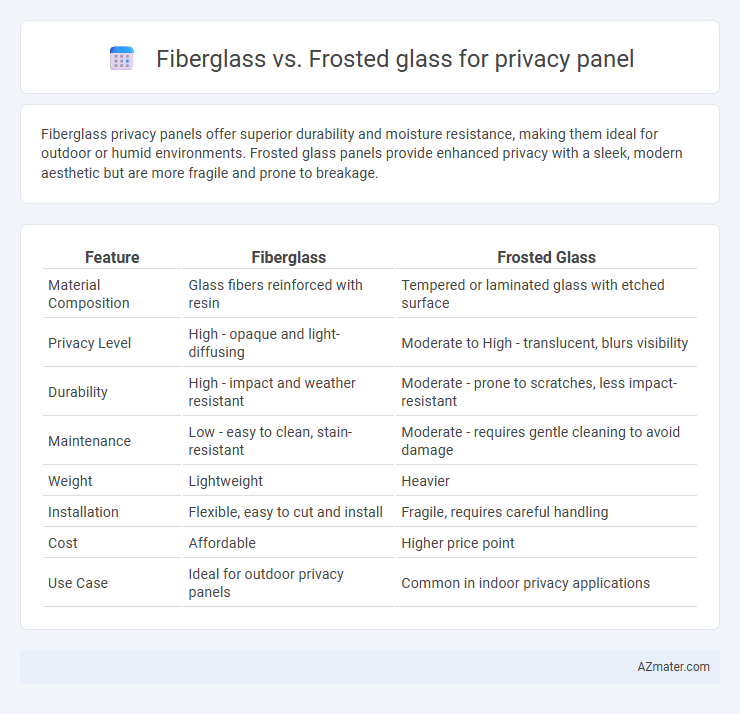Fiberglass privacy panels offer superior durability and moisture resistance, making them ideal for outdoor or humid environments. Frosted glass panels provide enhanced privacy with a sleek, modern aesthetic but are more fragile and prone to breakage.
Table of Comparison
| Feature | Fiberglass | Frosted Glass |
|---|---|---|
| Material Composition | Glass fibers reinforced with resin | Tempered or laminated glass with etched surface |
| Privacy Level | High - opaque and light-diffusing | Moderate to High - translucent, blurs visibility |
| Durability | High - impact and weather resistant | Moderate - prone to scratches, less impact-resistant |
| Maintenance | Low - easy to clean, stain-resistant | Moderate - requires gentle cleaning to avoid damage |
| Weight | Lightweight | Heavier |
| Installation | Flexible, easy to cut and install | Fragile, requires careful handling |
| Cost | Affordable | Higher price point |
| Use Case | Ideal for outdoor privacy panels | Common in indoor privacy applications |
Introduction to Privacy Panels
Privacy panels enhance space security and seclusion by obstructing visibility while allowing light transmission. Fiberglass offers a durable, lightweight option with high strength and resistance to moisture, making it ideal for exterior privacy panels. Frosted glass provides a sleek, modern aesthetic with effective light diffusion and obscured visibility, commonly used in interior privacy applications.
What is Fibre Glass?
Fiberglass is a reinforced plastic material composed of glass fibers embedded in a resin matrix, known for its high strength-to-weight ratio and durability in privacy panels. Unlike frosted glass, fiberglass offers superior impact resistance and weather tolerance, making it ideal for outdoor privacy applications. Its translucency can be customized to achieve varying degrees of privacy while allowing light diffusion.
What is Frosted Glass?
Frosted glass is created by sandblasting or acid etching clear glass to produce a translucent, matte finish that obscures visibility while allowing light to pass through, making it ideal for privacy panels. Compared to fiberglass, which is a composite material combining glass fibers and resin for strength and durability, frosted glass offers a sleek, modern aesthetic with consistent light diffusion and easy maintenance. Its ability to provide privacy without sacrificing natural light makes frosted glass a popular choice for office partitions, bathroom windows, and decorative panels.
Privacy Levels: Fibre Glass vs Frosted Glass
Fibre glass panels provide a high level of privacy due to their opaque and textured surface, effectively obscuring visibility while allowing light transmission. Frosted glass offers moderate privacy by diffusing light and blurring shapes, making it suitable for areas requiring partial privacy without complete obstruction. Choosing between the two depends on the desired balance of light diffusion and visual concealment, with fibre glass excelling in maximum privacy scenarios.
Durability and Maintenance Comparison
Fiberglass panels offer superior durability with high resistance to impact, moisture, and temperature variations, making them ideal for long-term privacy solutions with minimal maintenance. Frosted glass, while providing excellent privacy through its translucent finish, is more prone to scratching and breakage, requiring careful handling and occasional cleaning to maintain clarity. Fiberglass requires only periodic washing to prevent accumulation of dirt, whereas frosted glass panels need gentle cleaning agents to avoid damage to the etched surface.
Installation and Flexibility
Fiberglass panels offer lightweight installation with easy handling and can be cut or shaped on-site, providing superior flexibility for custom privacy solutions. Frosted glass requires professional installation due to its weight and fragility, limiting on-site adjustments and customization options. Fiberglass panels resist shattering and can be mounted on various surfaces, making them ideal for versatile, quick installations in privacy panel applications.
Aesthetic Appeal and Design Options
Fibre glass panels offer a sleek, modern aesthetic with customizable textures and colors that enhance privacy while complementing contemporary interior designs. Frosted glass provides a classic, elegant look with a translucent finish that diffuses light evenly and maintains privacy without compromising brightness. Both options allow for versatile design solutions, with fibre glass enabling bold patterns and frosted glass supporting subtle, minimalist styles.
Cost Analysis: Fibre Glass vs Frosted Glass
Fiberglass privacy panels generally offer a lower initial cost compared to frosted glass, making them a budget-friendly option for large-scale installations or projects with tight financial constraints. Frosted glass panels carry higher manufacturing and installation expenses due to the specialized glass treatment and increased fragility handling, often resulting in higher long-term maintenance costs. When factoring durability, fiberglass panels usually provide better resistance to impact and weathering, potentially reducing replacement frequency and overall lifecycle costs compared to frosted glass.
Best Applications for Each Material
Fibreglass is best suited for outdoor privacy panels due to its durability, weather resistance, and lightweight nature, making it ideal for garden fences and pool enclosures. Frosted glass excels in indoor applications where aesthetics and light diffusion are priorities, such as bathroom partitions, office dividers, and shower doors. Both materials provide privacy but fibreglass offers superior impact resistance, while frosted glass emphasizes a modern, elegant appearance.
Conclusion: Choosing the Right Privacy Panel
Fibre glass panels provide superior durability and excellent light diffusion, making them ideal for long-lasting privacy solutions in high-traffic areas. Frosted glass offers a sleek, modern aesthetic with high translucency but may require more maintenance due to its delicate surface. Selecting the right privacy panel depends on balancing durability, light transmission, and design preferences to meet specific functional and visual requirements.

Infographic: Fibre glass vs Frosted glass for Privacy panel
 azmater.com
azmater.com